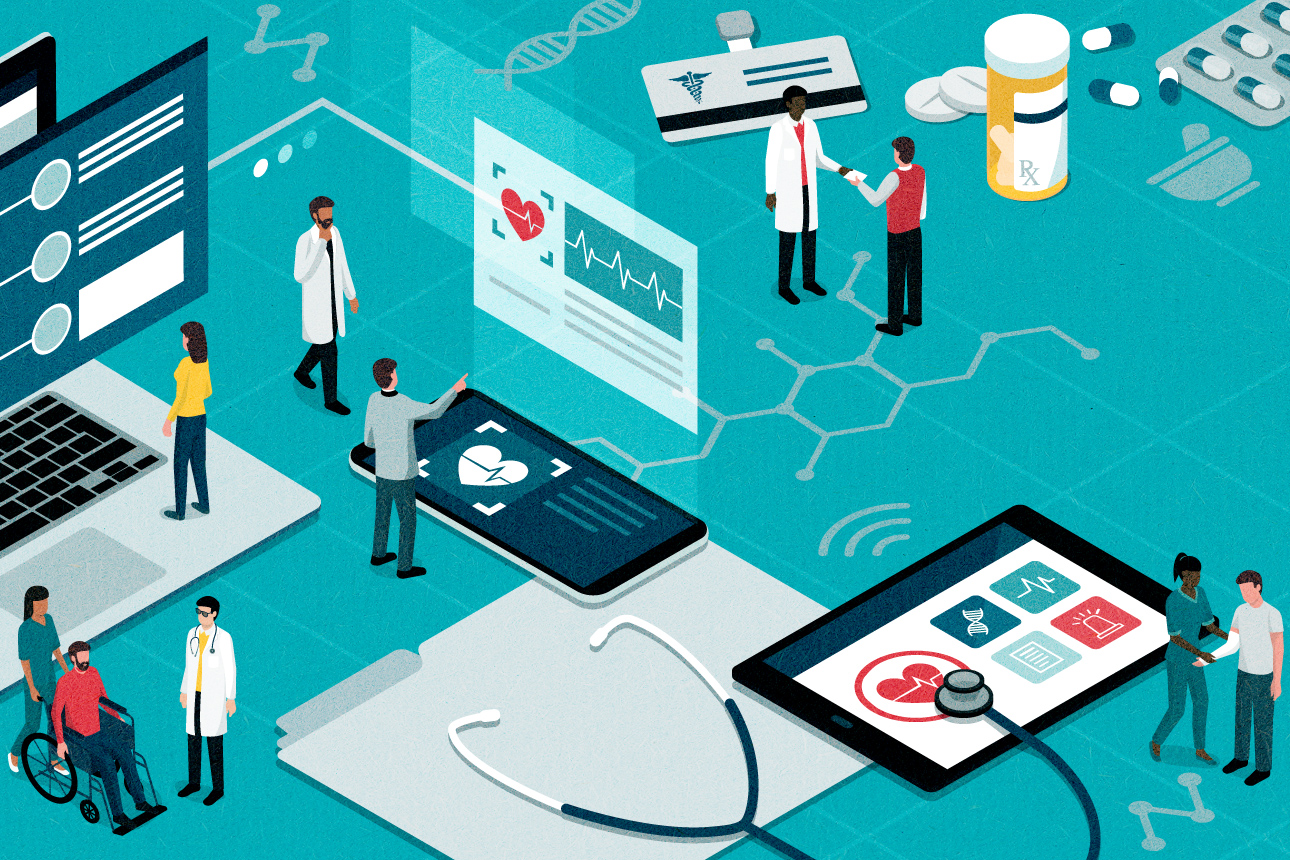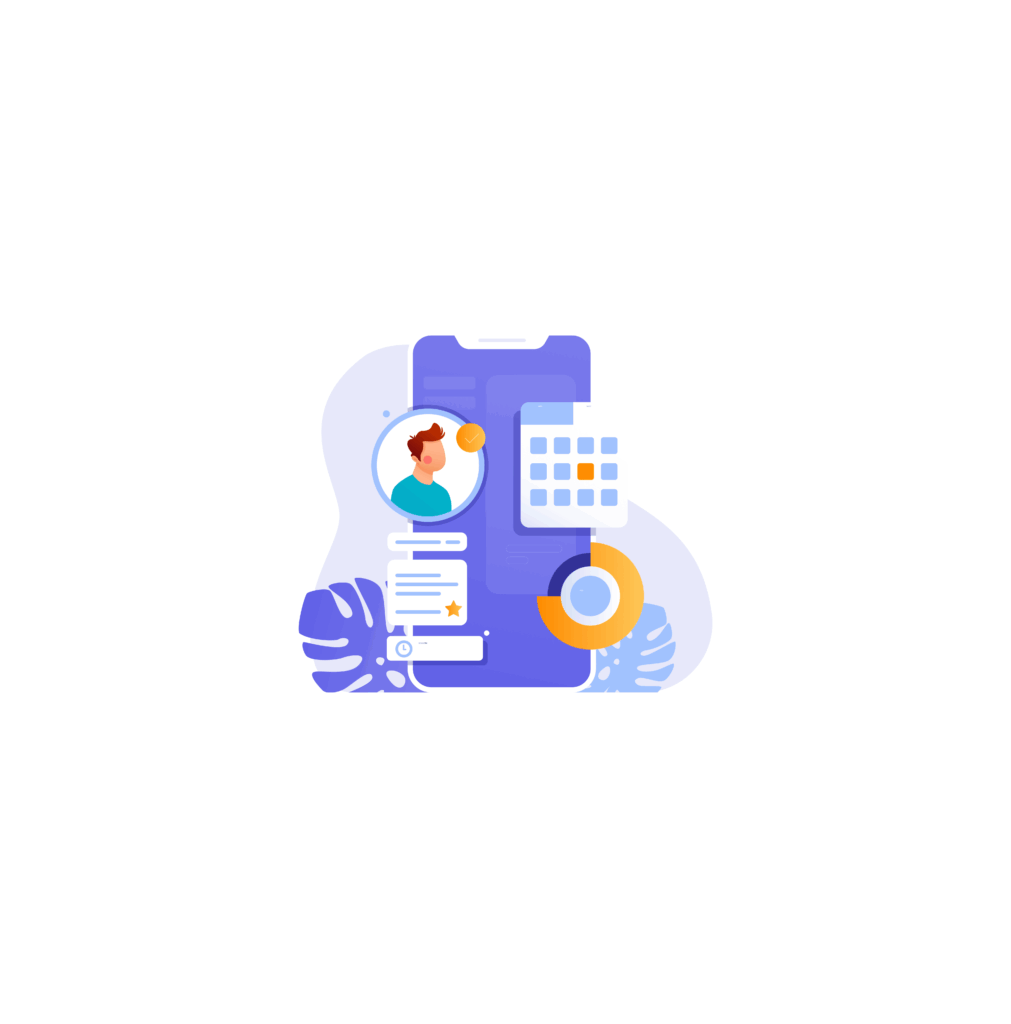Welcome to the future of healthcare! Artificial Intelligence (AI) is revolutionizing the way we diagnose and care for patients, leading to improved outcomes and personalized treatment plans. In this blog, we will explore the various applications of AI in healthcare, starting with its role in transforming the industry through digital transformation. From AI-powered diagnostic tools that aid in early detection to patient monitoring systems that provide real-time insights, we will delve into how AI is reshaping patient care. Additionally, we will discuss the impact of AI on telemedicine, medical research, and hospital management. We will also address the challenges and ethical considerations surrounding healthcare AI and explore future trends in this rapidly evolving field. Get ready to discover how AI is enhancing diagnosis and patient care in ways you never thought possible!
Table of contents
- The Role of AI in Transforming Healthcare
- AI Applications in Diagnosis
- AI and Patient Care
- Telemedicine and AI
- AI Applications in Medical Research
- AI and Hospital Management
- Challenges and Ethical Considerations in Healthcare Software
- Future Trends in Healthcare AI
- How has AI-enhanced E-prescribing software improved patient safety?
- Case Studies of Successful AI Implementations in Healthcare
- Conclusion
The Role of AI in Transforming Healthcare
AI is playing a vital role in transforming the healthcare industry. With its capabilities, AI can aid in diagnosing diseases and conditions more accurately and quickly. It can also help predict patient outcomes and identify high-risk patients. AI assists in drug discovery and development, leading to more effective treatments. Additionally, AI-powered chatbots and virtual assistants improve patient engagement and provide personalized care. Furthermore, AI enhances medical imaging analysis, enabling early detection of abnormalities. AI also optimizes hospital operations and resource allocation, improving efficiency and reducing costs.
Check out our article on AI in Healthcare: Revolutionizing Healthcare Through AI Technology.
Understanding AI and its Impact on Healthcare Software
AI technology is transforming the healthcare industry by improving diagnosis accuracy and patient care outcomes. Through the analysis of vast amounts of medical data, AI algorithms provide valuable insights for healthcare professionals. Early disease detection and prevention are made possible by AI-powered systems that detect patterns and trends in patient data. By automating administrative tasks, AI allows healthcare providers to focus more on patient care, reducing their workload. Additionally, the use of AI enhances patient engagement and improves the overall patient experience.
AI Applications in Diagnosis
AI has various applications in the field of diagnosis. With the help of machine learning algorithms, AI can analyze medical imaging such as X-rays, CT scans, and MRIs, resulting in faster and more accurate diagnoses. Additionally, predictive analytics powered by AI can analyze patient data to predict the likelihood of certain conditions or diseases, allowing for early intervention and preventive care. Virtual health assistants, in the form of chatbots and virtual assistants, can provide patients with personalized health information and guidance, improving access to healthcare. Moreover, AI algorithms can analyze extensive amounts of data to identify potential drug candidates, speeding up the drug discovery process. Lastly, AI enables remote monitoring of patients, allowing healthcare providers to track vital signs and provide virtual consultations, including pet scans, ultimately enhancing patient care and reducing healthcare costs.
AI-Powered Diagnostic Tools
AI-powered diagnostic tools, also known as medical diagnosis software, leverage advanced algorithms to analyze medical images and identify abnormalities with remarkable accuracy. This technology enables doctors to make faster and more precise diagnoses, ultimately leading to better patient outcomes. By processing vast amounts of medical data, these tools can uncover patterns that may go unnoticed by human physicians. As a result, AI-powered diagnostic tools lighten the burden on medical professionals, improving efficiency in healthcare systems. With the potential to revolutionize the field of healthcare, the implementation of medical research software and AI in diagnostic tools holds great promise for enhancing accuracy and saving lives.
Role of AI in Early Diagnosis
AI has a crucial role in early diagnosis by analyzing medical data to identify patterns and indicators of diseases, enabling timely intervention. It can process vast amounts of patient data, identifying potential risks and suggesting preventive measures. Additionally, AI assists healthcare professionals in interpreting diagnostic tests, improving accuracy and efficiency. Early diagnosis facilitated by AI leads to better treatment outcomes and improved patient prognosis. AI-powered virtual assistants enable patients to monitor their symptoms and provide real-time advice for early detection of health issues.
Here’s an article about Enhancing Healthcare with Custom Software Solutions.
AI and Patient Care
AI applications in healthcare have revolutionized patient care, enabling more accurate and faster diagnosis of diseases. By analyzing patient data and identifying patterns, AI algorithms can predict potential health issues. Additionally, AI-powered chatbots and virtual assistants provide personalized care and address medical queries. With the ability to streamline administrative tasks, AI allows healthcare professionals to focus on patient well-being. However, it’s crucial to address ethical considerations and privacy concerns when implementing AI in healthcare settings.
AI-Driven Patient Monitoring Systems
AI-driven patient monitoring systems leverage artificial intelligence algorithms to provide real-time data on patient vitals, including heart rate, enabling early detection of health issues. These systems efficiently track and analyze patient data, empowering healthcare providers to make informed decisions and provide top-quality medical services. By identifying patterns and trends in patient data, AI algorithms can predict and prevent adverse events. Additionally, automating routine tasks frees up valuable time for healthcare professionals, allowing them to focus on delivering personalized patient care. With their potential to improve patient outcomes and reduce healthcare costs, AI-driven monitoring systems are revolutionizing patient care.
Role of AI in Personalized Patient Care
AI plays a vital role in providing personalized patient care. By analyzing vast amounts of patient data, AI can identify patterns and generate tailored treatment plans. Predictive analytics powered by AI allow healthcare providers to anticipate patient needs and intervene early. Real-time support and guidance are made possible through AI-powered chatbots, improving access to care. Additionally, machine learning algorithms assist in diagnosing diseases and recommending suitable treatment options. By automating administrative tasks, AI enables healthcare professionals to focus more on direct patient care.
An article on AI and Custom Software: The Future of Digital Solutions might be of interest to you.
Telemedicine and AI
Telemedicine enables patients to receive remote medical care, reducing the necessity for in-person visits. AI-powered chatbots and virtual assistants provide basic medical guidance and direct patients to appropriate care. By analyzing patient histories and symptoms, AI algorithms aid healthcare professionals in accurate diagnoses. AI improves patient monitoring by analyzing real-time data from wearable devices, alerting providers to abnormalities, and allowing for more efficient use of medical personnel. Additionally, AI supports drug discovery and development, facilitating the search for new treatments and enhancing patient outcomes. The integration of telemedicine services and telehealth software, including mobile apps, powered by AI revolutionizes healthcare by increasing access to care and improving medical decision-making.
How AI is Revolutionizing Telemedicine
AI is revolutionizing telemedicine by enabling remote patient monitoring and real-time data analysis, improving diagnosis and patient care. AI algorithms assist healthcare professionals in accurately and efficiently diagnosing and triaging patients. AI-powered chatbots enhance patient engagement and provide timely medical advice. Additionally, AI helps reduce healthcare costs by optimizing resource allocation and workflow efficiency in telemedicine. It also enables virtual consultations, remote surgeries, and remote patient management. With AI, telemedicine is transforming the way healthcare is delivered, making it more accessible, efficient, and effective.
AI Applications in Medical Research
AI has transformed medical research in numerous ways. It can analyze medical images accurately, detecting diseases and abnormalities. AI-powered chatbots and virtual assistants offer basic healthcare information and triage services. Moreover, AI algorithms predict disease progression, aiding doctors in treatment decisions. Analysis of patient data by AI identifies patterns for improved diagnosis and personalized treatment plans. Lastly, AI assists in drug discovery, potentially leading to new treatment options. Integrating AI in medical research holds immense potential for advancements in diagnosis and patient care.
Role of AI in Drug Discovery and Development
AI plays a crucial role in drug discovery and development by analyzing vast amounts of data to identify potential drug candidates. This accelerates the drug discovery process, saving time and resources. Additionally, AI helps optimize the drug development process by reducing costs and time required for clinical trials. With AI-powered algorithms, drug efficacy, and safety can be better predicted, minimizing risks during the development stage. Furthermore, AI enables personalized medicine by analyzing patient data to tailor treatments and predict individual responses. It also enhances pharmacovigilance efforts by monitoring adverse drug reactions and identifying patterns for early intervention.
AI in Genomic Research
AI is revolutionizing genomic research by leveraging its analytical capabilities to analyze vast volumes of genetic data, enabling researchers to identify disease-causing variations that would be difficult for humans to detect. This technology also enables the identification of patterns and correlations in genomic data, providing valuable insights into the complex interplay between genes, environment, and health outcomes. Additionally, AI algorithms can predict an individual’s disease risk based on their genetic profile, facilitating personalized preventive care. Moreover, AI-powered tools are expediting the drug discovery process by accurately identifying target molecules and predicting their effectiveness.
Check out an article about Digital Transformation in Healthcare: Adapting to the New Era.
AI and Hospital Management
AI plays a crucial role in hospital management, aiding in more accurate and efficient disease diagnosis. It also helps hospitals enhance patient data management and streamline workflows for improved efficiency. AI’s ability to provide personalized treatment plans and recommendations significantly enhances patient care. Moreover, AI optimizes resource allocation and scheduling, leading to enhanced hospital operations. Additionally, AI contributes to medical research by analyzing large amounts of data, facilitating advancements in the field.
How AI is Transforming Hospital Management
AI is revolutionizing hospital management by automating administrative tasks like appointment scheduling and patient record management, increasing efficiency, and providing advanced management capabilities. It can analyze large volumes of data to identify patterns and trends, optimize resource allocation, and improve patient outcomes. AI-powered chatbots provide 24/7 support, reducing the burden on staff. Remote patient monitoring alerts healthcare providers to abnormalities or potential risks. AI helps predict patient demand and optimize staff schedules, ensuring adequate staffing. In summary, AI transforms hospital management by incorporating the use of medical equipment management software and hospital management software (hms), including medical billing software and practice management systems, streamlining processes, enhancing patient care, and improving overall operations with the integration of AI technology into medical practices.
Challenges and Ethical Considerations in Healthcare Software
Balancing privacy and data security while using AI in healthcare is crucial. It is essential to ensure that AI algorithms are unbiased and free from discrimination. Addressing concerns about job displacement due to AI automation is necessary. Striking a balance between human expertise and AI recommendations in patient care is a challenge. Ethical considerations arise when using AI for sensitive medical diagnoses and end-of-life decisions. Navigating these challenges and ethical dilemmas is fundamental to the responsible implementation of healthcare AI.
Addressing Data Privacy Concerns in AI Applications
Data privacy is a significant concern in healthcare AI, with the need to protect sensitive patient information, including electronic medical records and paper records, stored in EHR systems. Robust security measures and encryption protocols can help ensure the privacy of patient data in AI applications, such as EMR software. Healthcare organizations should adhere to strict regulatory guidelines and obtain informed consent from patients before using their data in AI systems. Transparency and accountability are crucial, with clear policies on data collection, storage, and usage. Collaboration between healthcare providers, AI developers, and policymakers is necessary to establish ethical frameworks prioritizing patient privacy and admittance in AI applications, including a separate patient portal for patients to access their information.
Ethical Dilemmas in AI-Driven Healthcare
AI-driven healthcare presents significant ethical dilemmas that need to be addressed. One concern is data privacy and security, as the use of AI raises questions about the protection of sensitive patient information. Additionally, there is a potential for bias in AI algorithms, which can lead to inequitable healthcare outcomes. Balancing the use of AI with human judgment is crucial to maintain patient trust and ensure that decisions are made ethically. Transparency and explainability of AI systems are essential for ethical decision-making, and establishing guidelines and regulations can govern the responsible use of AI in the healthcare industry.
Future Trends in Healthcare AI
AI-powered diagnostic tools offer the potential to enhance accuracy and speed in disease diagnosis. By analyzing patient data and medical records, AI can assist in developing personalized treatment plans. Chatbots and virtual assistants, powered by AI technology, can provide round-the-clock patient support and triage services, making diagnosis apps and personal health record software in general, an essential tool for patients. Additionally, AI can help predict patient outcomes and identify high-risk individuals for targeted interventions. Moreover, AI has the ability to streamline administrative processes such as billing, scheduling, and inventory management within healthcare facilities. These emerging trends in healthcare AI are poised to revolutionize the industry.
Emerging AI Technologies in Healthcare Software
Machine learning algorithms are revolutionizing the healthcare industry by analyzing medical images and enhancing diagnostic accuracy. Natural language processing (NLP) is being used to extract vital information from medical records, improving patient care and workflow efficiency. AI-powered chatbots offer personalized healthcare recommendations and assist with triage, enhancing the patient experience. Virtual reality (VR) and augmented reality (AR) technologies provide immersive training experiences for healthcare professionals, enabling them to enhance their skills and stay updated on the latest techniques. Additionally, robotics and automation are being integrated into healthcare settings, improving surgical procedures and streamlining tasks with interoperability using electronic health records and EHR software, as well as types of medical software such as healthcare apps, a crucial type of software in the healthcare industry. These are just some of the emerging types of healthcare software that are driving digital transformation in the healthcare industry.
Predicting the Future of AI in Healthcare
AI has the potential to revolutionize healthcare by predicting disease outbreaks and assisting in early diagnosis. By utilizing machine learning algorithms, patterns in patient data can be identified, leading to improved treatment plans and personalized care. AI-powered virtual assistants enhance patient engagement and provide real-time health monitoring. Moreover, AI-driven robotics can automate repetitive tasks, allowing healthcare professionals to focus on complex procedures. However, ethical considerations and data privacy concerns must be addressed as AI becomes more prevalent in healthcare.
There’s also an increase of Fintech for transactions in the industry, which uses AI based solution for financial institutions. Here, check out an article on Fintech Security: AI Solutions for Safe Transactions.
How has AI-enhanced E-prescribing software improved patient safety?
AI-enhanced E-prescribing software has significantly improved patient safety by reducing medication errors. With automatic checks for drug interactions and allergies, real-time access to medical history, and personalized medication recommendations based on patient data, this software has revolutionized the prescription process.
Case Studies of Successful AI Implementations in Healthcare
Case studies of successful AI implementations in healthcare showcase the transformative power of AI in various areas. One such area is the early detection of diseases. Healthcare software powered by AI algorithms can analyze medical images and data to identify early warning signs of diseases like cancer. AI also enables personalized treatment plans by processing large amounts of patient data and providing tailored recommendations based on individual characteristics and medical history, including test results.
Additionally, AI enhances remote patient monitoring through devices that can monitor vital signs and alert healthcare providers of any abnormalities, allowing for timely interventions. In drug discovery and development, AI analyzes vast amounts of scientific literature and data to identify potential new drug candidates and accelerate the process. Furthermore, AI-powered virtual assistants assist healthcare professionals with administrative tasks, documentation, and decision-making, improving efficiency and reducing burnout. The Tulipa app, designed for patients suffering from Parkinson’s disease, is a great example that demonstrates the potential of AI in healthcare. These case studies highlight the immense potential of AI in revolutionizing healthcare.
Conclusion
In conclusion, AI has proven to be a game-changer in the healthcare industry. From diagnosis to patient care, AI applications have paved the way for more accurate and efficient healthcare practices. With AI-powered diagnostic tools, early detection of diseases has become a reality, leading to better treatment outcomes. Additionally, AI-driven patient monitoring systems ensure timely intervention and personalized care for patients. Telemedicine, powered by AI, has revolutionized healthcare access, especially in remote areas. AI has also played a significant role in medical research, aiding in drug discovery and genomic research. However, it is crucial to address challenges and ethical considerations associated with healthcare AI, including data privacy and ethical dilemmas. Looking ahead, emerging AI technologies hold immense potential for further advancements in healthcare. The success stories of AI implementation in healthcare speak volumes about its transformative impact. If you want any kind of software solutions for your business, be sure to check out our company’s portfolio.



